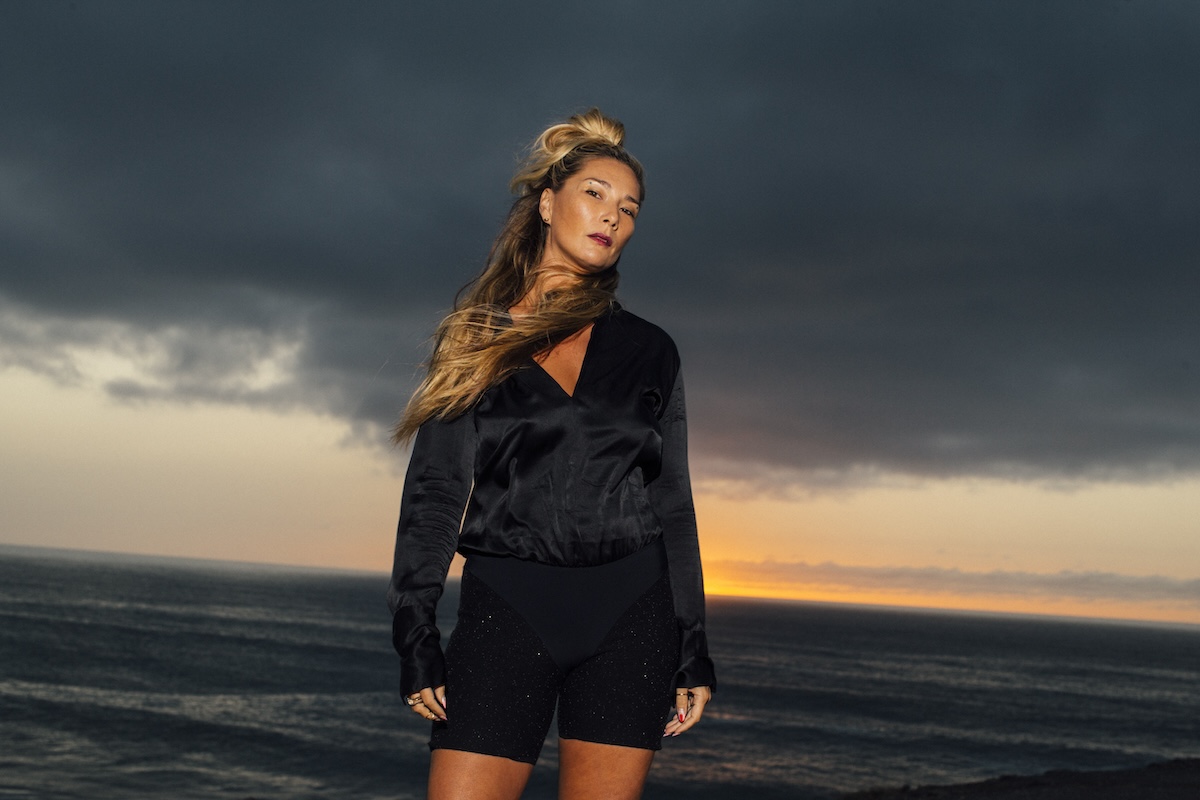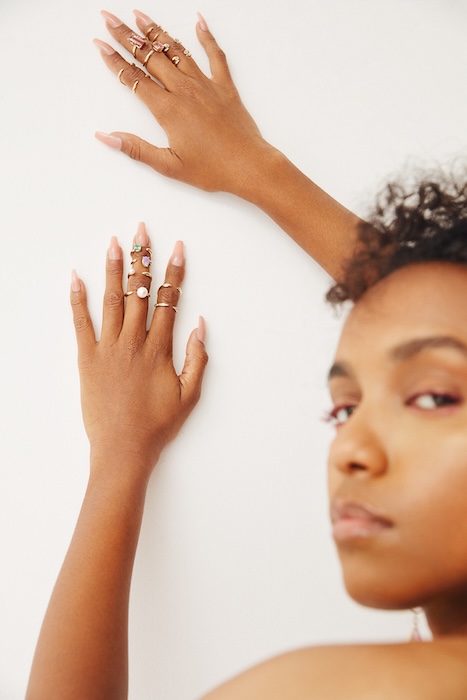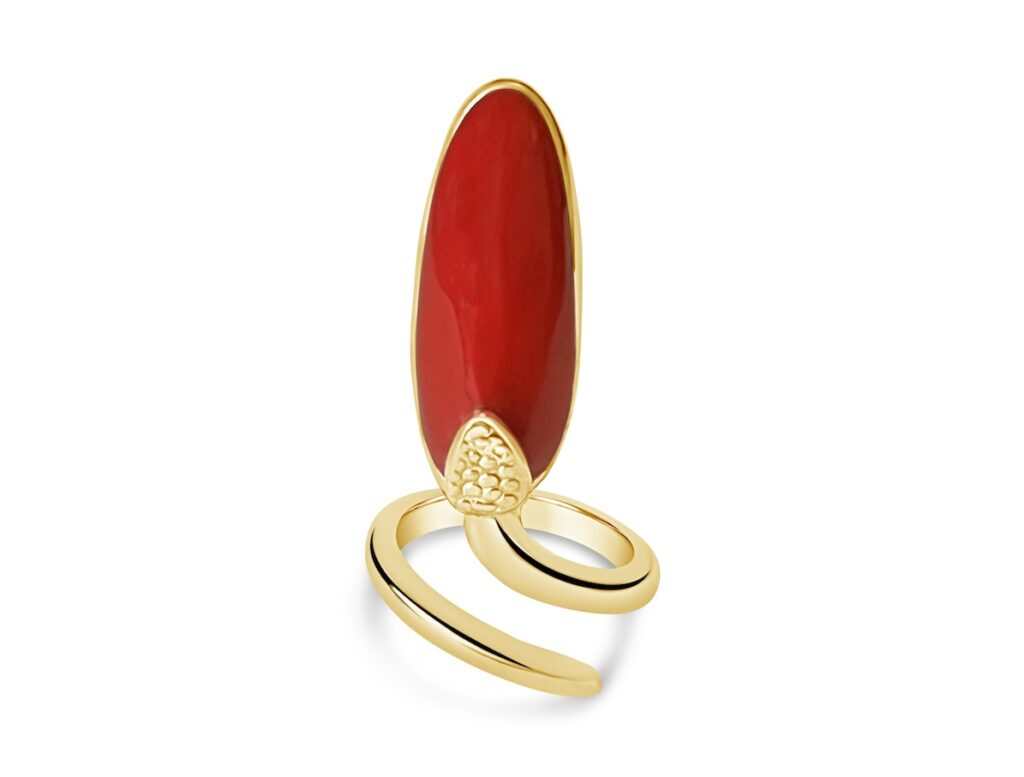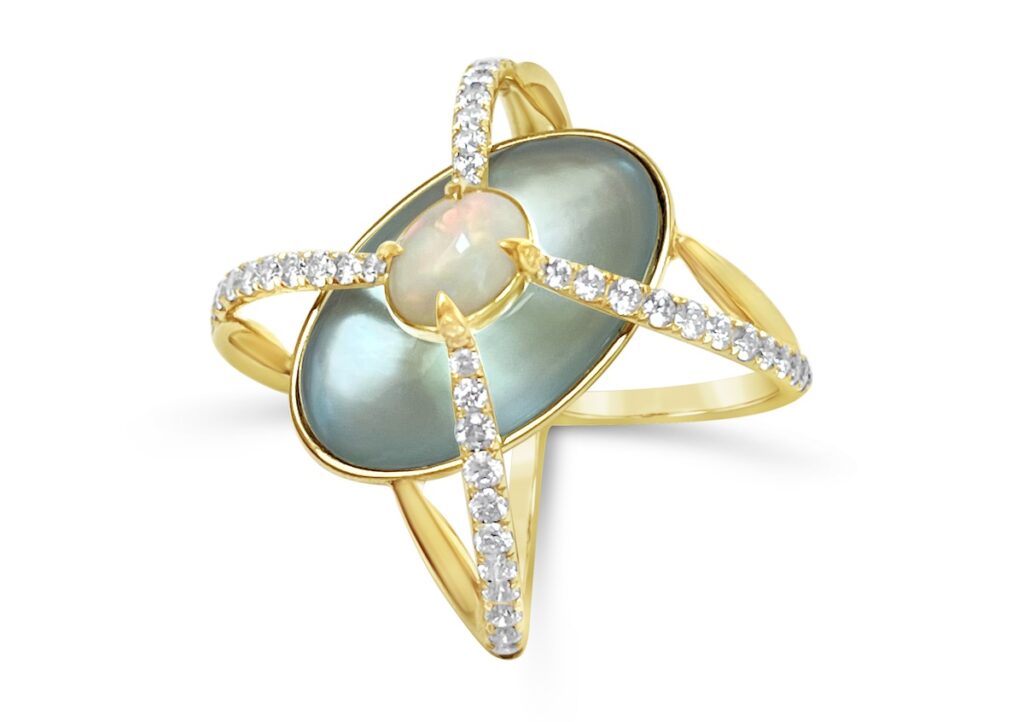
From the DJ Booth to Diamonds: How Nightlife Inspired Boundary-Breaking Jewelry Brand Bijules
December 18, 2023
Rana Good is the founder of Naïra NYC. A writer for publications such as Forbes, Travel + Leisure, Coveteur, Mens Journal and others, she created her own platform celebrating women of color.
Jules Kim’s jewelry brand Bijules launched, quite literally, on the dance floor two decades ago and continues to be inspired by nightlife, music, and rebellion. Working as a New York City nightlife promoter, you could find Kim at clubs every night but while others were partying, she was hustling, selling her hand-cut silver designs to partygoers. In an industry filled with reserved heritage brands, Bijules was innovative and fresh, redefining who gets to make jewelry and what jewelry looks like.
Kim quickly became famous for her bar ring and bespoke pieces and her unique designs which often referenced her Korean heritage through stones like mother of pearl. Her pieces re-imagined how jewelry can be worn like her nail ring which was and still is beloved by celebrities and trademarked for its unique design. Kim makes fashion and fine jewelry pieces, from bridal pieces to grillz.
While New York City serves as the forever inspiration for Kim, she recently moved to a new country where she’s expanding her operations and working to highlight female artisans. Read on to learn how Kim built a jewelry empire from the ground up and what’s next for her boundary-breaking brand.

How would you describe the look and inspiration behind Bijules?
Jules Kim: Bijules is inspired by bringing out someone’s inner personality and letting it speak for them without having to say a word. It’s statement-driven — my clients have always searched for this aesthetic, and once they see it, they know it’s for them. It’s not run-of-the-mill or ordinary. The inspiration comes from the streets of New York and nightclubs, and the Bijules aesthetic is something that’s driven by rebellion and self-expression.
What materials do you work with?
I work in 14 and 18-karat gold and do lots of bespoke work which extends into even higher gold carats. I work with semi-precious and precious stones ranging from Tanzanian Zircon to diamonds. I just finished a collaboration with De Beers and I work with natural diamonds and not lab-grown. When I started the brand 20 years ago, specifically in the nightclub, I was making everything in silver and I was making everything myself. I would hand-cut, solder, polish, and cast everything — honestly, I was crazy in the early days. That aesthetic was a handheld version of what it is now, now the design goes way beyond my skillset in terms of metalworking, and I have an international team of artisans that make everything.
How has New York inspired your designs?
New York has always been my heart. When I moved to New York, I was promoting parties with actual paper flyers with my initials scrawled on them and out until 6 am doing street promotion every night. That taught me a lot about finding like-mindedness in New York. It was straight-up street life and this awkward era between the digital and analog — this was one of the last generations that was able to communicate in that way. It has a stronghold on what Bijules represents; it’s girthy, hardy, and aggressive in the sense that it’s not waiting around for people. It’s always embracing rebellion and self-expression. New York has always been, and will always be, the mecca for youth to embrace what they don’t know yet and to take risks and forge new ground.
I didn’t think I was going to be a jeweler, I just thought “I need to make some cool shit!” I would bring all the pieces to the club and I would sell them behind the DJ booth — people would buy my pieces while they were dancing. I continue to do that even 20 years in, I just celebrated our anniversary at Le Bain with a rooftop party and I’m always partnering with nightlife and music, it’s the pulse of how I live.
Who are some of your favorite people who’ve worn your jewelry?
There’s a huge list of iconic people who have worn my stuff. The biggest celebrities I’ve worked with would be Beyoncé, Rihanna, and Doja Cat. There are also icons like Grace Jones. She’s inspired me, if I were reborn to be anyone at any time, I think I would choose her at Studio 54. I’ve worked with Bjork; she has an earring of mine in gold with a pearl. I’ve also made custom grills for Erykah Badu, she’s a great client. I’ve worked with rapper Eve since we were both babies, I met her a long time ago around 2008 or 2009. These are the women that run the world, so it’s a great list. I also work with infamous unknown people, people under the radar who are constantly giving and always sharing — they’re my ride or dies.

What pieces are most meaningful to you and why?
There are a few pieces that are super meaningful to me as they represent the hitching posts of my career. The bar ring I made in 2002 then became the calling card at the club, anyone who was wearing one of my pieces would get in for free. That inspired a total and complete understanding of what my aesthetic was in terms of design pillars, how simplicity can be developed, and how it can be renewed every season. I copyrighted my nail ring in 2008, at the time I just needed to make something completely dope for my friends who were singers, performers, and DJs, who needed something to perform with.
I was creating in the theory of hip-hop jewelry, like grills for the body. That idea continued and will continue for the rest of my career — how to make something that’s a statement, how to make something that doesn’t exist already, and how to popularize something that strengthens femininity.
The ebb and flow of the market is so fast and demanding that I get knocked off all day, every day, but it’s still something that I’m also grateful for. If I wasn’t being knocked off, then that would be an issue [laughs].
What’s your advice for someone who wants to launch a jewelry business?
If you want to launch a jewelry business, I recommend planning first. Jewelry is expensive and fine jewelry is extremely expensive. Being a person of color and leveraging my alternative existence in the luxury industry has been a supreme challenge with Bijules and I had to do it all alone. We have so many gatekeepers in the luxury industry, especially in the jewelry world where everything’s opaque. Things are beautiful, amazing, and priceless, but then there’s no transparency about its origin. You don’t know how the people are being treated at the source of the gemstone mining or the mining for the gold material, for example.
There’s an inequality that’s a problem. I seek to be a voice in trying to establish some transparency within our industry and that will only come from someone like me. It’s not going to come from someone who’s endowed with generational wealth and is born into the luxury industry. Because I’m an underdog, I push up from the street into the luxury chain.

What’s next for Bijules and you?
What’s next for my brand is that I’m opening my Milan studio and continuing to be international across the globe. I’m maintaining certain mandates that are specialized in highlighting female artisans. I recently did a documentary in Bangkok at one of my factories.
If I were a huge volume jewelry conglomerate, I wouldn’t be able to create these types of equity-based mandates. I’m super blessed to be able to have that and privileged to be able to lift the stories of those who cannot. I’m developing heartfelt initiatives that are based on endorsing emotion inside of luxury goods and supporting the underdog.